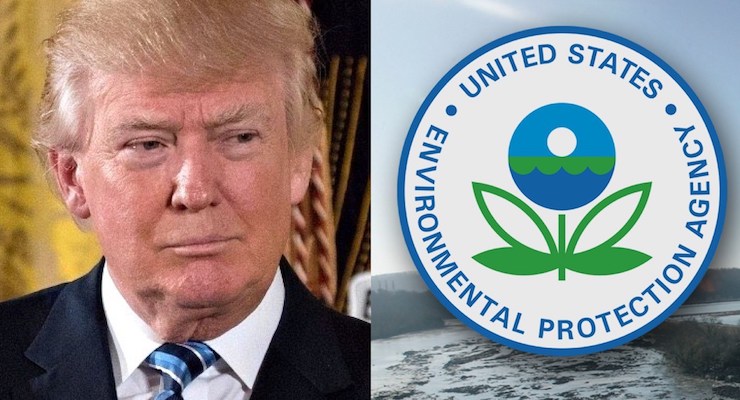

President Donald J. Trump, left, speaks from the East Room. The Environmental Protection Agency (EPA) seal, right.
President Donald J. Trump signed an executive order Tuesday directing a review of a controversial Obama-era water rule governing 60% of U.S. waterways. The order implemented by the former president not only gave the federal government broad regulatory authority over permanent waterways such as rivers but also seasonal ponds, streams, ditches and other wetlands.
President Trump also signed several other items, including two bills, ahead of his address to a joint session of Congress.
The regulation the president targeted is known as the “waters of the United States” rule governing wetlands and other water bodies under the Clean Water Act. When implemented, property owners, farmers and others said it was “confusing and complex.”
The order–titled Presidential Executive Order on Restoring the Rule of Law, Federalism, and Economic Growth by Reviewing the “Waters of the United States” Rule–instructs the Environmental Protection Agency (EPA) and Army Corps of Engineers to review it.
At the signing, he also cited its impact on jobs and the economy.
“We’re going to free up our country and it’s going to be done in a very environmental and positive environmental way, I will tell you that,” President Trump said. “[We will] create millions of jobs, so many jobs are delayed for so many years that it’s unfair to everybody.”
Congressional Republicans have tried to repeal the Obama-era water rule, and the House Speaker praised the president’s order.
“The Obama administration’s sweeping WOTUS rule has been a disaster for Americans in the West,” House Speaker Paul Ryan, R-Wis., said in a statement. “That’s why the House voted to repeal it last year. I welcome President Trump’s review of this rule and hope it will be repealed once and for all. The livelihoods of America’s farmers, ranchers, and cattlemen are at stake.”
President Trump’s order requests the EPA and U.S. Army Corps to look specifically at a 2006 opinion written by the late Justice Antonin Scalia on the jurisdictional scope of the Clean Water Act. The plurality opinion in a split decision would have reduced the scope of the act by defining “waters of the United States” as covering only permanent, standing or continuous flowing bodies of water.
It also instructs Attorney General Jeff Sessions to suspend ongoing court litigation in response to a number of legal challenges against the rule, which hasn’t fared well under legal scrunity. The Ohio-based Sixth Circuit Court of Appeals issued a stayed, thus putting a hold on it.
Also on Tuesday, President Trump signed the “Presidential Executive Order on The White House Initiative to Promote Excellence and Innovation at Historically Black Colleges and Universities.” It moves the HBCU (Historically Black College and Universities) offices back from the U.S. Department of Education to the White House, which the White House says will allow the HBCU to be a partner with the administration in creating jobs and helping to make inner cities safer.
The other piece of legislation that the president signed was the “Inspire Act,” which incentivizes NASA to have women participating in science, technology, engineering and mathematics. The final bill aims to promote women entrepreneurs by encouraging the National Science Foundation to use existing federal programs to improve on and support employment of women.






